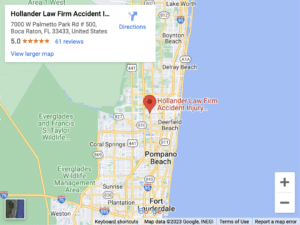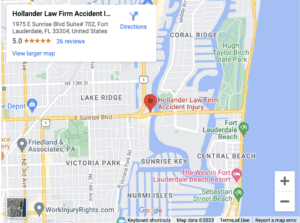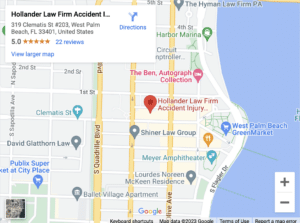
Nerve damage can take many different forms. A severed nerve could produce paralysis. A pinched nerve might produce pain and muscle weakness.
In many cases, doctors cannot repair damaged nerves or relieve the symptoms of nerve damage. As a result, your nerve damage could produce ongoing or recurring symptoms that affect your ability to work. Your nerve damage could also impact daily tasks such as walking, driving, or sleeping.
Nerve damage can greatly affect the lives of accident victims. Here are some facts about nerve damage and the ways that nerve damage can affect your injury claim.
Table of Contents
How Does Nerve Damage Happen?

Your nervous system includes your brain and nerves. Your brain connects to your cranial nerves and spinal cord. The cranial nerves connect your brain to your head, including your eyes, facial muscles, and ears. The spinal cord connects to everything from your neck down.
The spinal cord runs through the spinal canal in your back. At each vertebra, nerve roots branch off of the spinal cord. These nerve roots connect body regions to your spinal cord. For example, a nerve root runs to your left leg.
The nerve roots further branch out into peripheral nerves. These peripheral nerves connect to specific muscles, muscle groups, or organs.
The nerves carry nerve signals between your body and your brain. These nerve signals consist of electrical signals sent with the help of ions. In other words, nerves function a bit like wires and a bit like pipes.
When neurons get severed, they cannot transmit these nerve signals. A severed nerve will result in paralysis and loss of sensation in the body part or organ connected to the nerve.
Neurons can also suffer damage without getting severed. A bone, ligament, or other tissue pressing on a nerve can irritate it. The nerve may become inflamed. And the inflammation could disrupt the nerve signals or cause the nerve to misfire.
What Symptoms Arise From Nerve Damage?
Nerve damage can lead to a wide variety of symptoms. Your symptoms may depend on the type of nerve signal that gets disrupted or interrupted.
Nerves carry three types of nerve signals. These include:
Autonomic Signals
Autonomic signals control your body’s involuntary systems. These systems run without conscious thought. Autonomic signals regulate functions such as:
- Heartbeat
- Respiration
- Digestion
- Temperature control
- Sexual arousal
Nerve damage that disrupts autonomic signals can cause the following symptoms:
- Arrhythmia
- High or low blood pressure
- Irregular breathing
- Inability to sweat
- Constipation
- Acid reflux
- Sexual dysfunction
- Loss of bowel or bladder control
These symptoms can significantly diminish your quality of life. They could also impair your ability to work.
Motor Signals
Your brain sends motor signals to your muscles to flex or extend. This causes your body to move, make facial expressions, and speak.
When nerve damage disrupts motor signals, you may experience symptoms like:
- Paralysis
- Weakness
- Slurred speech
- Limited range of motion
- Loss of dexterity and coordination
The location of the nerve damage will determine the body parts affected. For example, nerve damage in your elbow could affect motor signals sent to your wrist, hands, and fingers.
Sensory Signals
Sensory signals carry signals from your body to your brain. These signals give your brain the information it needs to control your body.
Disruption of sensory signals can cause the following symptoms:
- Pain
- Numbness
- Tingling
- Burning
- Throbbing
- Loss of sensitivity to hot or cold
- Loss of vision or blurred vision
- Loss of hearing or tinnitus
Peripheral neuropathy happens when the peripheral nerves for a particular body part experience a loss of sensory signals. It usually develops in the extremities such as the hands, lower legs, and feet.
What Are the Risk Factors for Nerve Damage?
Nerve damage can arise from conditions such as diabetes or an autoimmune disorder. It can also result from trauma. Certain types of injuries have a higher risk of nerve damage. These include:
Nerve Damage from Burn Injuries
Burn injuries include injuries from:
- Heat
- Combustion
- Chemicals
- Radiation
Burn injuries damage nerves. In first- and second-degree burns, only the nerve endings get damaged. This causes pain, but it usually will not cause any permanent loss of sensation.
On the other hand, third-degree burns damage tissue deep below the burn site. In some cases, third-degree burns may destroy the nerves.
Nerve Damage from Physical Trauma
Trauma from car accidents, slip and fall accidents, and other accidents can cause nerve damage. This can happen in a few different ways:
Broken Bones
When you fracture a bone, the jagged end of the bone can tear muscles, tendons, blood vessels, and nerves. When nerves get severed by a broken bone, you may lose both sensation and movement below the break. Thus, a broken femur can cause numbness and loss of movement in your toes.
Crushing Injuries
Crushing injuries can damage soft tissue cells. Crushed nerves cannot carry nerve signals properly, which can disrupt your ability to move your limbs or respond to your environment normally.
Back Injuries
Back trauma can injure the spinal cord or the nerve roots that branch off of the spinal cord. Bone fragments from a fractured vertebra can sever or compress nerves in the spinal cord and nerve roots. A disc that bulges into the spinal canal can pinch the spinal cord.
Repetitive Motions
Workplace accidents can result in trauma that damages nerves. But some types of work can damage nerves through repetitive motions.
Repetitive motions can cause soft tissue to swell. The swollen tissue presses on nerves, causing the nerves to inflame. Carpal tunnel syndrome happens when ligaments in your wrist inflame and compress the median nerve.
What Compensation Can I Recover for Nerve Damage?
To get compensation for nerve damage, you must show your injury resulted from someone else’s negligent or intentional actions. For example, if you suffered nerve damage after a pedestrian accident caused by a careless driver, you can seek compensation.
Your injury compensation will include your economic and non-economic damages. Economic damages will cover the financial impact of your injuries, such as your medical expenses and lost earnings.
Non-economic damages compensate you for your diminished quality of life. Your non-economic damages can include compensation for physical pain, mental suffering, and an inability to participate in daily activities like driving.
Contact a Boca Raton Personal Injury Lawyer for Help
Nerve damage could justify substantial economic and non-economic damages. Contact us at Hollander Law Firm Accident Injury Lawyers for a free consultation to discuss your injuries and the compensation you could receive for nerve damage. Our Boca Raton personal injury lawyers are standing by.



